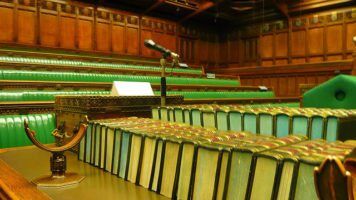

News
Strathclyde Review: ERS ‘This Is Not What Real And Lasting Lords Reform Looks Like’
The government has today published a review by Lord Strathclyde on secondary legislation and the relationship between the House of Lords and the House of Commons.
The Prime Minister said: I am grateful to Lord Strathclyde for the hard work he has put into this report. I will consider his recommendations carefully before responding in the New Year.
Lord Strathclyde was asked in October to consider how to secure the decisive role of the House of Commons in relation to its primacy on financial matters and secondary legislation.
Since then, he has been working with a panel of parliamentary and legal experts to look at options for providing the House of Commons with a decisive role in secondary legislation. The report details 3 possible options:
Option 1 would remove the House of Lords from the statutory instrument procedure altogether – to take statutory instruments through the House of Commons only
Option 2 would seek to retain the present role of the House of Lords but clarify the restrictions on how its powers should be exercised, by codifying them passing a resolution
option 3 is a compromise option would create a new procedure in primary legislation. The new procedure would allow the House of Lords to ask the House of Commons to think again when a disagreement exists but gives the final say to the elected House of Commons
His report has recommended option 3.
Lord Strathclyde said: “In my review, I have looked carefully at the history and current practice of the House of Lords as it regards secondary legislation and financial matters and I have spoken to a wide range of parliamentarians. I believe that my recommendations strike the right balance between preserving the vital role of the House of Lords in scrutinising legislation, and enabling the elected House of Commons to have a decisive role on statutory instruments.”
Commenting on the proposals, Katie Ghose, Chief Executive of the Electoral Reform Society, said: “Scrapping the Lords’ veto over secondary legislation was rarely mentioned before the Lords voted against the Government’s tax credits proposal in October, yet suddenly it is all the rage. We cannot make piecemeal changes to the Lords’ powers every time there is a disagreement between the two Houses.
“If the Government accept the recommendations of Lord Strathclyde, they will be scrambling in response to the politics of the day, rather than implementing real, lasting and democratic changes.
“This proposal would require primary legislation, which will be a real challenge to get through Parliament. If the Government is planning to go to the trouble of passing a law to reform the Lords, they should stick to their official party policy and pass the one reform people really want – an elected second chamber.
“There are all sorts of problems with the House of Lords, like the fact that in the 2010-2015 parliament, £360,000 was claimed by Peers in years they failed to vote once, or that it has more members who used to work in the Royal Household than from manual labour backgrounds [3]. Instead of rushing to put out fires, the Government needs to look at the issue of Lords reform in the round.
“The problem with the House of Lords isn’t its blocking power – it’s that it has no legitimacy. We have the second largest upper House in the world (after China’s), and the only fully-unelected second chamber in Europe. But to have a truly effective revising chamber it needs to have a mandate, and that can only come through people being able to hold Peers to account.
“Just one in ten think the Lords should remain completely unelected [4]. This ‘headless chicken’ approach to Lords reform won’t work. We need to see genuine democratic reform of this bloated and out-of-date chamber.”


 Environment12 months ago
Environment12 months agoAre Polymer Banknotes: an Eco-Friendly Trend or a Groundswell?

 Features11 months ago
Features11 months agoEco-Friendly Cryptocurrencies: Sustainable Investment Choices

 Energy11 months ago
Energy11 months agoThe Growing Role of Solar Panels in Ireland’s Energy Future

 Energy12 months ago
Energy12 months agoHow Renewable Energy Can Help Combat Climate Change, According to Indra Energy




























